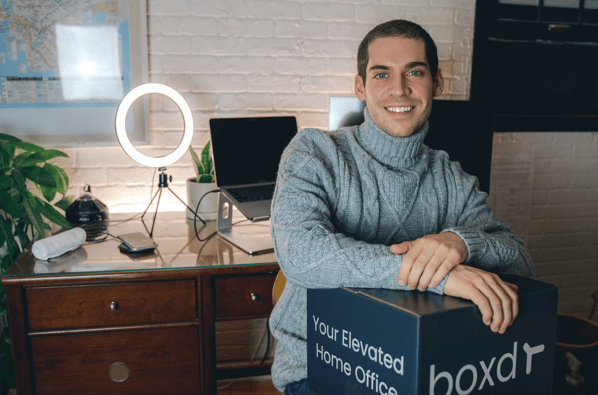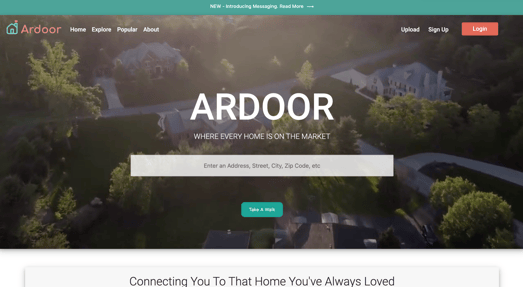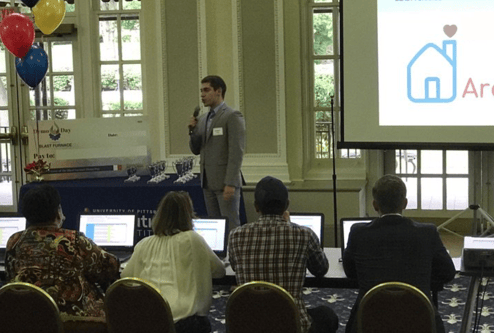 Marty Bacik '18 (pictured) with his new startup boxd. Photo courtesy of Marty Bacik.
Marty Bacik '18 (pictured) with his new startup boxd. Photo courtesy of Marty Bacik.
In our next installment of our "Beyond the BIC" blog series, we're featuring Marty Bacik '18, a Pitt alum and Founder of Pitt spinout Ardoor and recent startup boxd, as he shares what major decision he had to make regarding his first startup and how that impacted his life now, what entrepreneurship lesson he learned from country music artist Kacey Musgraves, and the importance of being kind in the world of business.
Ripping Band-Aids
In 2017, I met with a business owner and family friend in a Bob Evans to discuss how to actually get a web application built for my startup, Ardoor. I had finished the Big Idea Center’s Blast Furnace program about a year prior, and went through the customer discovery, ideation, messaging, and branding of Ardoor. There was just one problem: the concept of Ardoor was centered around a web platform, and I didn’t know how to code! In Bob Evans that day, the man I was getting advice from, Mike, said that we could build Ardoor as a mobile app using offshore resources for approximately $10,000. We had spent a year searching for people that could build Ardoor, and here it was right in front of us! Despite all of this, something in my gut told me not to go for it. I mean, $10,000 is a lot of money (even for something we believed in), and we still didn’t know if the idea would actually work. We finished our coffees, and I rejected Mike’s proposal because I felt that even if I could make the simplest, low-cost version of Ardoor, also known as an MVP (“minimum viable product” – a Blast Furnace vocab word), that that would be enough to test it. This was the first Band-Aid I ripped.
By ripping the proverbial Band-Aid of not taking money to pump into Ardoor and instead building the platform myself, two things happened. First, since I was so determined to bring this platform to life, I ended up teaching myself how to code, and then a year later got a job as a software engineer. (Life, and especially entrepreneurship, is not linear. Be open to everything, you may just surprise yourself!) Secondly, I had to face the ugliness. There was nothing standing between me and my potential customers and I had no excuses. Without any sort of funding, there were no fancy cold brew machines and I had no employees, and because of this I had to take a long, hard look at the actual problem I was solving and determine if what I built could benefit people. If no one used my product, it was no one’s fault but my own.
 The homepage of Ardoor's website, Marty's first startup. Photo courtesy of Marty Bacik.
The homepage of Ardoor's website, Marty's first startup. Photo courtesy of Marty Bacik.
Surprise! The first iteration of Ardoor didn’t work, and I’ve been tweaking it since, to my own benefit. In hindsight, if I decided on that fall day in Bob Evans to throw $10k at this idea to have it built, I would’ve had $10k less to pay for something I ended up doing myself, I wouldn’t have my current job, and the platform would be, for lack of a better word, garbage without all the changes I’ve made to the original idea. With this being said, I’m glad that I bit the bullet and grateful for how things worked out the way that they did!
I feel that we live in a time when so much of our focus is on funding (to the point where it’s romanticized) and not on actually creating a beneficial product/service that just so happens to make money. I see so many articles that solely highlight how much a company raises in round C of funding. Okay, but what is the product like and does it excite people? Funding is a very easy way to place Band-Aids over fundamental problems with business models and ideas as a whole (see Uber). One of the Blast Furnace lessons that has stood out to me the most is that every idea can be dulled down into a minimum viable product (MVP), even if it hardly looks like your vision and even if you have to fake it. Be careful about fundraising unless it’s absolutely necessary, and rip any Band-Aids that you can, even if it’s hard to look.
Slow Burns
It would be challenging to name an artist in the last five years whose music has had as much of an impact on me as Kacey Musgraves has. If you haven’t listened, first of all do so, but she has a song called Slow Burn which, to paraphrase, talks about taking your time and letting the world turn. For myself, as I assume it is for a lot of my fellow entrepreneurs, this is the complete antithesis of my ideal of accomplishing 157 different things by age 23! But, I think we can all learn a little from this song and message.
Out of all my time at Pitt, I have no idea why this is such a distinct memory, but I remember walking across the bridge over Forbes Avenue and daydreaming about becoming a celebrity founder of sorts while still at Pitt. It definitely took me a few years to learn, but if you expect your startup to become an overnight success, what will most likely happen is that you’ll drive yourself to frustration and ditch the idea entirely. I think in a world that often idolizes Harvard drop out Mark Zuckerberg, it becomes easy to fall into this trap of thinking that convinces you that you are failing if you don’t succeed the first time. In actuality, this is merely one data point out of hundreds.
To highlight this point even further, some of the most successful startups waited 10+ years for their time in the limelight! Wanting success and fame is fine, but if that’s your only reason for working on a startup, you’ll set yourself up for failure. However, what will get you through the lonely nights and the long months is finding purpose and a larger mission in what you’re creating. Creating a startup is a slow burn in its purest form. There will be countless amazing memories and twists and turns before there’s any glimmer of large success (I myself am still on this journey). If you’re working on something that excites you and you believe in it, don’t just give up because it didn’t work the within first year or even five years. Let the world turn and enjoy the ride. After all, no one is truly an overnight success.
 Marty pitching Ardoor during the Big Idea Center's Blast Furnace program. Photo courtesy of Marty Bacik.
Marty pitching Ardoor during the Big Idea Center's Blast Furnace program. Photo courtesy of Marty Bacik.
Being Kind
During the pandemic, I started my second business called boxd. Shortly after launch, I had someone from a Pittsburgh organization reach out to me about wanting to chat and brainstorm potential collaboration ideas. In a world where for so many of us our only mode is “I’m so busy”, I try to at least answer everyone. We had a great Zoom call and vibed really well. Just recently, we got our largest ever boxd order because we were recommended by, you guessed it, the woman I had the call with.
You truly never know in this life who will be your greatest supporter down the line, so take that meeting and hear everyone out. If I had simply brushed off that meeting, if I thought I was “too busy”, how different the landscape of our business would look today.
We were lucky enough to be featured on the local media for a segment about boxd. I had an old friend from high school reach out to me after it was printed saying that she told her grandma that she knew me from high school and that I was “one of the most genuine people she has ever met”. It’s so easy for me to get caught up in creating, building, or whatever else I do and forget that at the end of this life, no one is going to care about how much I sold or how many users I had. That text from my friend brought back into focus what I often forget, in life people remember us not by what we did but how we treat them.

Connect with Marty on LinkedIn
About Ardoor:
Ardoor, in it's essence, is a new way of buying homes. Ardoor allows potential home buyers to contact homeowners of off market homes and indicate their interest in buying those homes.
About boxd:
We all found ourselves suddenly working and interacting from home. As we have transitioned from in person relationships to virtual interactions, our remote image needs to keep pace.
boxd is here to help! They've curated and extensively tested products to elevate your remote image during video meetings, while teaching or attending classes, on job interviews, and even during social hangouts. They’ve thought about lighting, sound, posture and productivity and boxed it up for you. The more professional you appear and sound, the more seriously you will be taken. They are excited for you to try their box of products and know that it will take your home office productivity, comfort and image to the next level!
Each boxd purchase benefits FirstBook, an organization that delivers books and educational resources to children and schools in low-income communities. You can read more about FirstBook here.
Check out boxd's YouTube channel